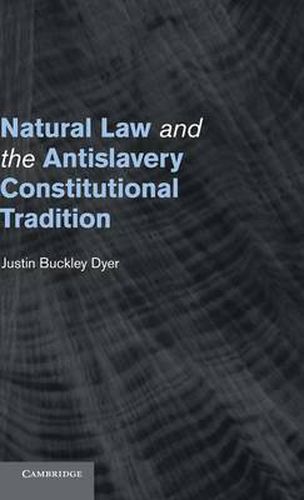Readings Newsletter
Become a Readings Member to make your shopping experience even easier.
Sign in or sign up for free!
You’re not far away from qualifying for FREE standard shipping within Australia
You’ve qualified for FREE standard shipping within Australia
The cart is loading…






In Natural Law and the Antislavery Constitutional Tradition, Justin Buckley Dyer provides a succinct account of the development of American antislavery constitutionalism in the years preceding the Civil War. Within the context of recent revisionist scholarship, Dyer argues that the theoretical foundations of American constitutionalism - which he identifies with principles of natural law - were antagonistic to slavery. Still, the continued existence of slavery in the nineteenth century created a tension between practice and principle. In a series of case studies, Dyer reconstructs the constitutional arguments of prominent antislavery thinkers such as John Quincy Adams, John McLean, Abraham Lincoln and Frederick Douglass, who collectively sought to overcome the legacy of slavery by emphasizing the natural law foundations of American constitutionalism. What emerges is a convoluted understanding of American constitutional development that challenges traditional narratives of linear progress while highlighting the centrality of natural law to America’s greatest constitutional crisis.
$9.00 standard shipping within Australia
FREE standard shipping within Australia for orders over $100.00
Express & International shipping calculated at checkout
In Natural Law and the Antislavery Constitutional Tradition, Justin Buckley Dyer provides a succinct account of the development of American antislavery constitutionalism in the years preceding the Civil War. Within the context of recent revisionist scholarship, Dyer argues that the theoretical foundations of American constitutionalism - which he identifies with principles of natural law - were antagonistic to slavery. Still, the continued existence of slavery in the nineteenth century created a tension between practice and principle. In a series of case studies, Dyer reconstructs the constitutional arguments of prominent antislavery thinkers such as John Quincy Adams, John McLean, Abraham Lincoln and Frederick Douglass, who collectively sought to overcome the legacy of slavery by emphasizing the natural law foundations of American constitutionalism. What emerges is a convoluted understanding of American constitutional development that challenges traditional narratives of linear progress while highlighting the centrality of natural law to America’s greatest constitutional crisis.